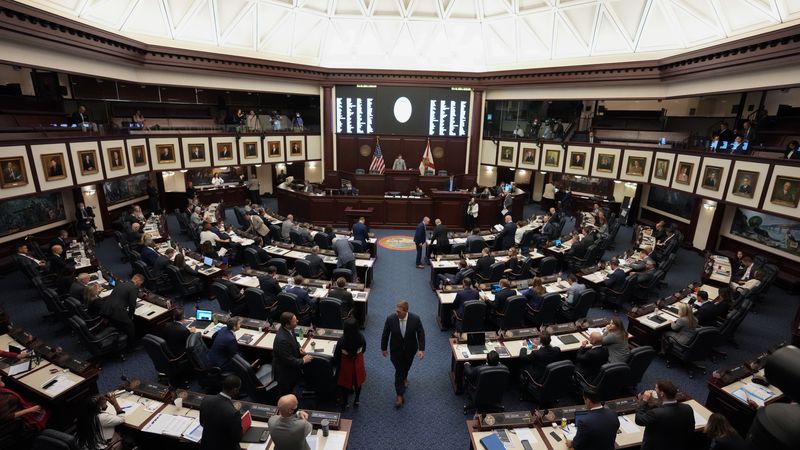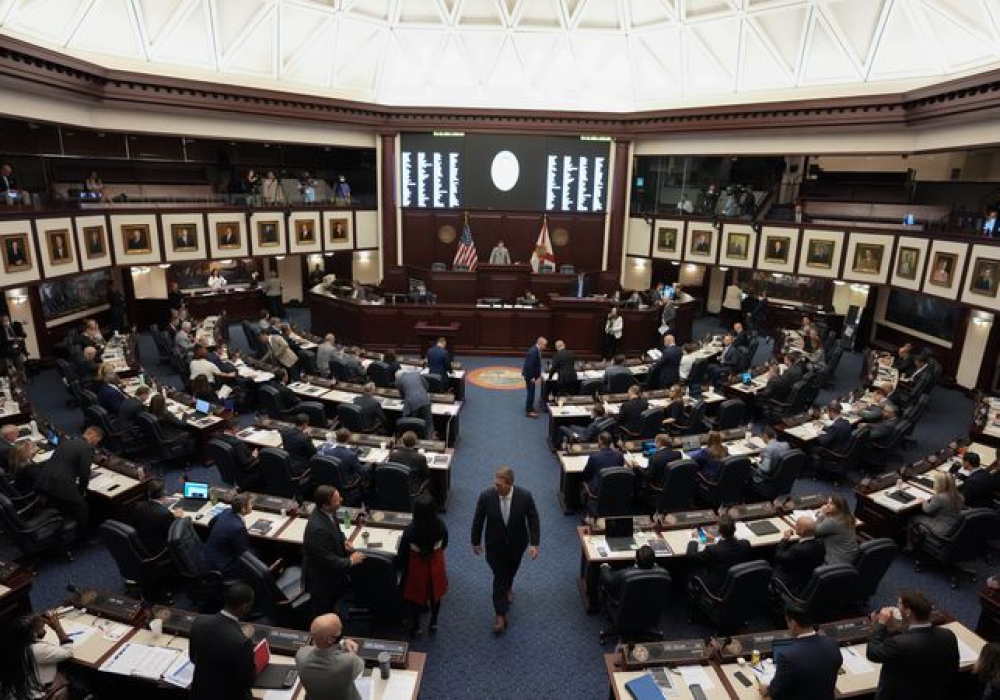TALLAHASSEE — On the last day of Florida’s special legislative session, the message from Republicans: Our party will fight federal mandates.
The Democratic party line: this week’s lawmaking was a gigantic waste of time.
But the fate of the three-day session is still to be decided. Details in the most important bill are up to the state’s Department of Health to interpret. And federal courts will determine how the bills passed by Florida lawmakers Wednesday will be felt in the workplace.
If Florida Gov. Ron DeSantis and Attorney General Ashley Moody succeed in their court challenges of President Joe Biden’s administration, the bills take full effect. That would mean Florida companies could not mandate COVID-19 vaccines for their employees without first offering several exemptions.
If the court cases don’t go Florida’s way, federal rules would override the bills. Under one of the rules, issued by the Occupational Safety and Health Administration, thousands of workers at larger companies would have to get vaccinated or tested regularly — or risk losing their jobs once the Jan. 4, 2022 deadline passes.
“If Gov. DeSantis gets the opportunity to sign the bill that we’ve sent him this week, it will be the law in Florida for all businesses,” House Speaker Chris Sprowls, R-Palm Harbor said Wednesday, noting that the workplace rule has been put on hold by a federal court. “We will continue to have to litigate (Occupational Safety and Health Administration) to its entirety. I believe … that we’re going to be successful.”
Two other court cases will shape the fate of the laws just passed by the Legislature. Another Biden administration rule requiring federal contractors to get the vaccine has already been challenged by the state. And DeSantis has pledged to fight a Centers for Medicare and Medicaid Services vaccine mandate for health care workers. That rule has been challenged by at least 10 states. Florida, so far, is not yet among them.
At stake in the federal courts are four bills now on their way to DeSantis. The governor is all but certain to sign all four.
Those bills do the following:
- Restrict businesses’ ability to mandate vaccines for their employees. Companies have to offer workers a number of exemptions or risk fines of at least $10,000 per violation from the state. This measure would expire June 1, 2023.
- Ban school districts from passing mask mandates, and prohibit governments from enacting vaccine requirements for public sector employees.
- Create a public records exemption to conceal from public view investigations by the attorney general’s office into violations of the law restricting vaccine mandates. The investigations would become public once they are closed — except for an individual’s religious or medical information.
- Direct DeSantis to form a plan for the state to eventually create a new agency to replace the federal Occupational Safety and Health Administration in monitoring workplace safety.
- Strike from state law the surgeon general’s ability to mandate vaccination for an individual during a public health crisis.
The measures fall short of what DeSantis urged before the special session began. Lawmakers did not enact a blanket ban on vaccine mandates in the workplace. The bills do not apply retroactively to businesses that have already laid off employees who refuse to get vaccinated.
Democrats say the session was less about policy, and more about DeSantis sending a message to a bloc of primary voters who oppose the vaccine or mandates to take the vaccine.
“I think it’s very beneficial for him in what his main target is at this point, which is to be the Republican nominee for president in 2024. This allows him to whip his base up,” said Rep. Evan Jenne, D-Dania Beach, of DeSantis. “In terms of policy, it’s a loss for the people of the state of Florida.”
Democrats don’t unify
Despite hours of debate in the House and Senate Wednesday, Democrats failed to mount an organized resistance to the measures. Republicans defeated Democratic amendments, or ruled them out of order. In the House, at least one Democrat voted for each of the final bills.
In the Senate, Democrats had the numbers to stop a bill that would prevent the public disclosure of state investigations of businesses suspected of breaking the vaccine mandate law. Democrats control 16 seats in the 40-person Senate, and bills that make public records secret require a two-thirds vote in the Legislature.
During an afternoon caucus meeting, Sen. Gary Farmer, D-Lighthouse Point, argued that if his colleagues took a stand against the exemption, it could endanger the broader bill restricting vaccine mandates. If the complaints against businesses were not made secret, Farmer theorized, they could contain confidential medical information that would violate federal law.
“Without the public records exemption, this whole scheme clearly, objectively violates (federal law),” Farmer told his colleagues. “We can end this attack on the independence of our businesses.”
But Democrats needed to be organized to stop it, and Farmer and other senators noted that their colleagues were avoiding the topic. Only 9 of the 16 Democratic senators showed up for the caucus meeting — Sens. Loranne Ausley of Tallahassee, Lauren Book of Plantation, Randolph Bracy of Orlando, Tina Polsky of Boca Raton, Linda Stewart of Orlando, Janet Cruz of Tampa and Annette Taddeo of Miami missed it.
And moments after Farmer said he was moving for the caucus to take a position against the bill, Sen. Darryl Rouson, D-St. Petersburg, stood up and walked out, which left the meeting without a quorum — and without taking a vote on the bill.
The measure later passed in the Senate with Rouson and Stewart voting in favor. Four other Democrats did not vote.
House Democrats also declined to take a caucus position against the public records exemption bill. Although they had the votes to defeat it if they voted as a bloc, the measure passed with eight Democratic votes.
DeSantis floats a future fight
Now that the bills are set for the governor’s signature, DeSantis is turning his attention to the courts. A state challenge to the federal Occupational Safety and Health Administration rule argued last week that the measure is a “backdoor attempt to dictate the personal health decisions of millions of ordinary Americans, many of whom have deeply personal reasons to decline to be vaccinated.”
The federal rule at issue includes exemptions for workers who have a religious objection, or for whom the vaccine is medically dangerous. Workers may also choose to be tested weekly at their own expense under the rule.
But DeSantis said even if the courts side with the federal government, he has a plan: He would ask private employers not to comply with the vaccine mandate.
“My view would be: don’t comply, and we would support the Legislature taking some of the stimulus money and using it to pay off the fines for businesses,” DeSantis said on Monday night when speaking to the National Federation of Independent Business, a small business advocacy group.
When asked about the governor’s proposal, House Speaker Chris Sprowls sidestepped the question on Wednesday.
“I think we are going to win the litigation,” Sprowls said. “I really do.”
Times/Herald reporter Ana Ceballos contributed to this story.










